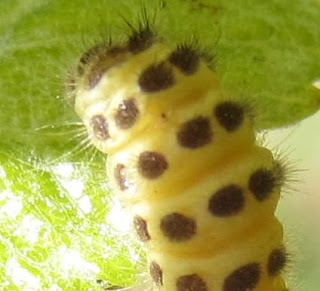We are now back to manual hoeing to remove weeds in the vine rows. This is not so bad. I've found that the tall grasses, if they haven't established a foothold can be pulled out by hand and if the carpetweed (Mollugo verticillata) is growing, finding the taproot is an effective way of removing what looks like a huge area of weeds.
Doing weeding brings me up close and personal to interesting things in the vineyard such as this caterpillar. I stopped to take it's photo with my handy Canon ELPH300HS that has a macro option. I'm not really good at taking macro photos but sometimes luck is on my side. We were able to identify this caterpillar as the Harrisina americana, the grapeleaf skeletonizer.
I'm thinking to myself, "If you grow grapevines, they will come." I've never seen a caterpillar that looked like this or the previous blogpost on the Eumorpha pandorus, the Pandorus Sphinx moth. The Wikipedia entry on Harrisina americana, mentions that this caterpillar has hair-like setae that produces hydrogen cyanide a potent antipredator toxin. If you brush against this setae it can give you a rash that lasts for days! Good thing I had my gloves on when I squashed this caterpillar which was only about 1/2-inches long and looked relatively harmless to me. Who knew!
The moth of the grapeleaf skeletonizer looks like this, shown on the left:3
References:
1. Wikipedia entry on Harrisina americana: The Grapeleaf Skeletonizer.
2. The University of Florida has more information: Harrisina americana.
3. Wikipedia image of Grapeleaf Skeletonizer



No comments:
Post a Comment